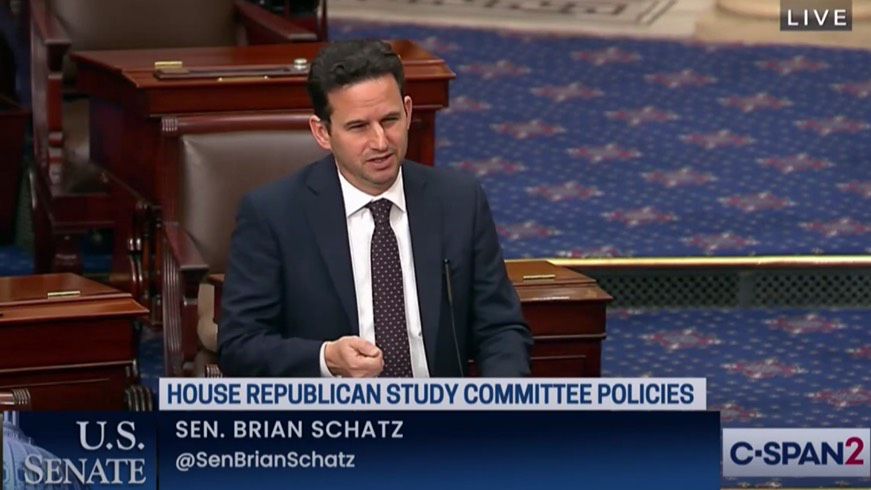Taking to the Senate floor on Friday, U.S. Sen. Brian Schatz, D-Hawaii, slammed a budget plan proffered by a group of House Republicans that would raise the Social Security retirement age, restructure Medicare and roll back key provisions of the Affordable Care Act.
“Health care is a necessity and not a luxury, and it shouldn’t be something that the political parties argue about,” Schatz said. “In the richest country in human history, having it should not depend on your job or your economic status. It ought to be available and accessible and affordable to everybody. The vast majority of Americans agree, but there’s only one party today fighting to make it a reality.”
On Wednesday, the 170-member Republican Study Committee released “Fiscal Sanity to Save America,” which, though not a formal piece of legislation, proposes a budget for Fiscal Year 2025 that could be implemented if Republicans gain full control of Congress and Donald Trump is elected president in November.
The group is chaired by Rep. Kevin Hern, R-Okla., and includes House Speaker Mike Johnson, R-La.
The proposed plan argues that the Social Security program is unsustainable as currently structured and will require across-the-board 23% cuts to benefits when it becomes insolvent in 2033. According to RSC, the three most likely solutions that will be debated are transfers from the general fund, tax increases and program savings.
“Without enacting a massive increase in taxes that will imperil the economy or a multi-trillion-dollar general fund transfer that worsens our fiscal situation, Congress and the president will have to work in bipartisan fashion to consider options that create savings for Social Security,” RSC stated.
The program savings RSC proposes would involve changes to Social Security retirement age, a reduction of benefits for those who are not near retirement and earn more than the wealthiest benefit category and phase out certain auxiliary benefits for high-income earners.
The RSC plan for Medicare is similarly framed by projections of unsustainability and future insolvency that, if left unaddressed, will necessitate significant cuts in benefits.
In this case, the RSC cites a projected 24% increase in enrollment by 2030, resulting in a depletion of the Hospital Insurance Trust Fund and an 11% reduction in payments to providers.
The proposed solution includes transition Medicare into a premium support model in which the traditional federal Medicare program would compete with “Medicare Advantage” plans administered by private insurance with beneficiaries receiving subsidies to choose the plan they wish. Under the plan, Medicare’s trust funds would be merged into a singular fund that would be responsible for paying premium support subsidies to cover the vast majority of their premium costs. This new singular trust fund would be funded with revenues from existing payroll taxes, Part B premiums, and Part B and D cost sharing.
The Medicare strategy also includes reforms of graduate medical education payments and the establishment of “site-neutral” payment policies that would not differentiate between inpatient and outpatient reimbursements.
The RSC budget plan also takes aim at the Affordable Care Act, passed 14 years ago this week, which it says “has not fulfilled its promise to guarantee plan retainment, affordability, quality of care or availability of doctors.
“Indeed, its result has been quite the contrary,” the RSC stated. “It dramatically expanded the administrative state, inserted government bureaucrats between all Americans and their doctors, and destroyed competition in the marketplace. It has spurred consolidation in the health care industry, narrowed provider networks, and increased out-of-pocket costs to levels that are unaffordable for many families.”
The plan’s proposed reforms include rewards for continuous coverage, promotion of portability and authorization for individual states to “determine the minimum attributes and cost-sharing parameters of plans to best meet the needs of their own citizens.” The plan provides for a significant rollback of existing regulations.
During Wednesday’s speech, Schatz dismissed the budget proposal as “outlandish” and “way out of the mainstream.”
“If budgets are a statement of values, then Republicans are making no secrets of theirs: Less access to quality health care and less control over their personal health,” Schatz said.
Schatz said that if Republicans have their way, millions of Americans will lose their health care, seniors and those with pre-existing conditions would be subject to “outrageous” out-of-pocket costs, young people will be kicked off their parents’ health plans and women would be forced to carry unviable pregnancies to term.
Schatz also chided Republicans for their continued efforts to dismantle and repeal ACA through legislation, executive orders and Supreme Court cases.
“It was 14 years ago we passed the Affordable Care Act, which since has helped more than 40 million Americans get their coverage and improved health outcomes for so many people—women, children, seniors, people with disabilities, people in rural communities. It’s no wonder that, more than a decade later, the ACA continues to grow in popularity and is setting new records every year for enrollment. Why? Because people actually like having health care. Republicans, Democrats, independents, voters, not voters— everybody basically thinks we should have a system that treats you humanely if you’re sick.”
On Wednesday, Schatz also reintroduced the State Public Option Act, which would allow states to create a Medicaid buy-in program for all residents regardless of income.
“There are still millions of Americans, especially in the middle class, who don’t get coverage through work but make too much to qualify for subsidies,” Schatz said. “They deserve coverage, too. The State Public Option Act, which I’m reintroducing today, bridges that gap. It provides a public option to anyone who wants health insurance by allowing states to create a program not based on income.
“These programs have shown to lower costs, increase consumers’ choice in plans, and improve equity in coverage,” he continued. “Several states, including Maine, Minnesota and New Mexico, already are exploring creating exactly this kind of buy-in approach. The State Public Option Act would help other states to follow suit.”



